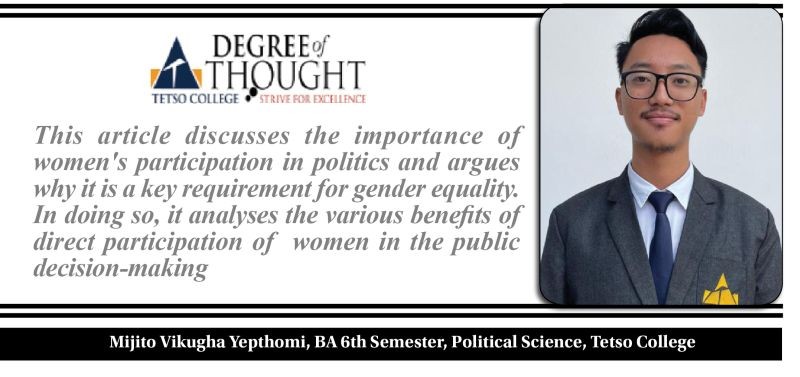
Women in politics have been the topic of many debates and discussions worldwide. If we look at the traces of history, there are only a few women political leaders. Is it because of societal norms and repression of women that we see fewer women in politics, or is there another factor that we as a society fail to see?
One of the main reasons women's representation in politics is so crucial is that it allows for diverse perspectives and experiences to be considered when making decisions that affect society as a whole. When both men and women work together for the greater good, things come to fruition, and we get to see different perspectives on why some things work and others don't. But the question arises: do we elect women just for the sake of representation or because of their qualities?
Despite recent progress, women continue to remain underrepresented in politics around the world. In the context of our Nagaland, two women candidates were recently elected: Hekani Jakhalu and Salhoutuonuo Kruse are the state's first two women MLAs and have made political history in Nagaland. Kruse also made another landmark for women by becoming the first woman minister in the State. Getting elected itself is a significant achievement for women and society in general, as they were never represented in the Nagaland Legislative Assembly. This is a significant step forward for the people, as we will witness their vision and the changes they bring to our state. A breath of fresh air awaits Nagaland.
There are several reasons why women still need to be represented in politics. One of the main reasons is cultural and societal norms that often see women as less capable or less qualified than men to hold political office, given the nature of Naga society; being a patriarchal society does not help either. Secluded from making decisions, women often centre their lives around household works and rearing children. However, as times change, we see more women active in political campaigns, and their work behind the scenes is making the rounds. We can be hopeful for more representation in the state, owing to the fact that we have our first two women MLAs.
Another reason for the underrepresentation of women in politics is the lack of money, power, and resources. Women often face greater financial blockades when running for office, as they may not have access to the same networks and donors as men. In a man-dominated society, it is hard for women to play on the same field as men because they are often lacking behind; even if they have the same or more resources, the social aspect remains a great foe for them to overcome.
Several strategies can be employed to overcome the above mentioned barriers and increase women's political participation. One strategy is to encourage women's leadership and political participation from a young age by offering educational and mentoring opportunities for girls and young women. Additionally, political institutions and systems should be reformed to better support women's political careers; this can be initiated by providing funding and resources specifically for female candidates and adopting policies that promote work-life balance.
In conclusion, women's representation in politics is essential for ensuring that diverse perspectives and experiences are taken into account when making decisions that affect society as a whole. However, significant barriers to women's political participation remain, including cultural and societal norms, a lack of funding and resources, and discrimination. We can work towards a just and inclusive political system for all by promoting women's leadership and addressing these barriers.
The Degree of Thought Column is a weekly community column initiated by Tetso College in partnership with The Morung Express. The column explored contemporary social, cultural, political, and educational issues and challenges around us. However, the views expressed here do not reflect the opinion of the institution. Tetso College is a NAAC-accredited, UCG-recognized Commerce and Arts college. Currently, the Degree of Thought Column is managed by the department of Mass Communication, and the editorial team are Dr Jenny Lalmuanpuii, KC Gabriela and Rinsit Sareo. For feedback or comments, please email:dot@tetsocollege.org.






